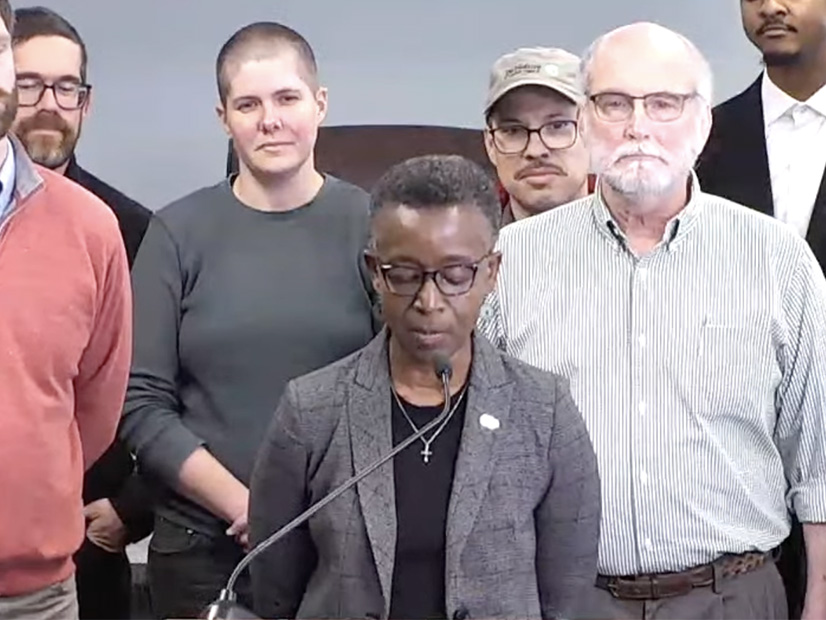
The town of Carrboro filed a lawsuit against Duke Energy on Dec. 4 in North Carolina, alleging its inaction and deception on climate change has cost the municipality millions.
While similar lawsuits have been filed against oil and gas firms — including one against the utility NW Natural Gas — Carrboro’s is the first suit by a municipality against an electric utility for its contribution to climate change.
“The town of Carrboro is seeking compensation for damages we’ve suffered and will continue to suffer because of Duke Energy’s climate deception campaign, which has spanned several decades,” Mayor Barbara Foushee said at a press conference. “The corporation has disregarded the immense harm it has imposed on our town and other communities across North Carolina and the country by working against reducing the use of fossil fuels.”
Foushee was flanked by other town officials, including members of the Town Council that voted unanimously Dec. 3 to file the lawsuit. Carrboro is in the Raleigh-Durham area, and it filed its lawsuit in Orange County Superior Court, with nonprofit NC WARN paying the legal fees.
With the U.S. and other wealthy countries failing to meaningfully address climate change, it is important to hold their corporate polluters to account, NC WARN Executive Director Jim Warren said.
“We all hope this lawsuit can help the many communities … that have been hurt already by climate disasters,” Warren said. “As the lawsuit shows, it was Duke Energy’s top bosses that are the culprits. They used denial, confusion [and] greenwashing, and even claimed global warming is good for us. They did all this to keep their profits rolling along.”
The lawsuit alleges Duke misled the public to believe it is committed to renewable energy and that this has delayed the transition away from fossil fuels, materially worsening the climate crisis. As evidence that the company has known about climate risks for decades, it cites a 1968 Edison Electric Institute conference Duke executives attended, where they heard a presentation from a scientist who said carbon dioxide’s concentration in the atmosphere was growing and would lead to major consequences.
The lawsuit also cites work from the Electric Power Research Institute, which included Duke executives on its board from its earliest days, that flagged carbon emissions and their impact on average temperatures in the 1970s.
Despite the knowledge of climate change, Duke and its corporate predecessors continued to cast doubt on it publicly for decades, the lawsuit alleges. While in more recent times the utility has claimed to be a leader in green energy, those claims clash with its continued fossil emissions and plans to keep building natural gas-fired power plants, it says.
“Although Carrboro is working to mitigate the impacts of climate change, as a result of the ever-worsening impacts of the climate crisis, the town is incurring, and will continue to incur, millions of dollars in damages,” the lawsuit says. Those include repairing town roads more frequently, building improved protections against more regular and devastating storms, and paying bigger bills to Duke itself as town buildings need to run air conditioners more often.
The lawsuit does not seek any limits on Duke’s emissions or operations, just its liability for damages associated with its overall greenhouse gas emissions.
Duke supported new coal plants as recently as 2007, when it was planning to add new capacity that could be retrofitted with carbon capture and storage, a still-nascent technology.
“Over the next decade or more following these statements, Duke and its proxies would repeatedly and publicly support continued reliance upon fossil fuels by misrepresenting that CCS could prevent the problems associated with the emission of carbon due to the use of coal,” the lawsuit says.
In comments to EPA on its power plant rule last summer, Duke said CCS would not even be ready by the agency’s proposed 2035 deadline, the lawsuit notes.
More recently, Duke has been shutting down coal plants, but it has replaced much of the capacity with natural gas-fired units, which the lawsuit argues are no better for the climate.
“Duke is currently engaged in one of the largest natural gas buildouts among any utility or energy company in the United States,” the lawsuit says. “Duke’s deceptions concerning natural gas have materially delayed the transition away from fossil fuels and toward renewable energy, including because these deceptions have caused the public to falsely believe that Duke is an environmentally conscientious corporation and thereby incentivized the public to continue to transact business with Duke.”
Duke said in a statement that it is reviewing the town’s complaint.
“Duke Energy is committed to its customers and communities and will continue working with policymakers and regulators to deliver reliable and increasingly clean energy while keeping rates as low as possible,” it said.



